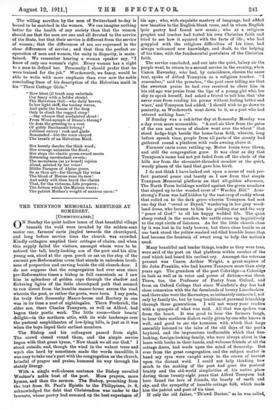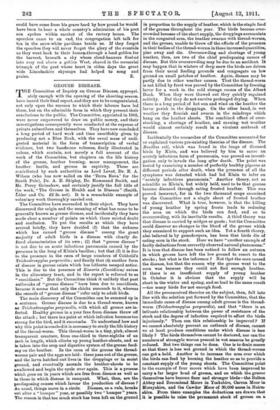THE TENNYSON MEMORIAL MEETINGS AT SOMERSBY. [COMITICATBD.]
ON Sunday the quiet hollow lanes of that beautiful village beneath the wold were invaded by the seldom-seen motor car, farmers' carts jingled towards the churchyard, and long before service time the church was crowded. Kindly cottagers emptied their cottages of chairs, and when this supply failed the visitors, amongst whom were to be noticed the tall, burly-looking son of the poet and his slim young son, stood at the open porch or sat on the step of the ancient pre-Reformation cross that stands in unbroken loveli- ness of proportion and carving beside the old church-door. I do not suppose that the congregation had ever seen since pre-Reformation times a bishop in full canonicals as I saw him in splendour of golden cope through the shadow and flickering lights of the little churchyard path that seemed to run direct from the humble manor-house across the road wherein the poet, or rather the poets, were born. I say poets, for truly that Somersby Manor-house and Rectory in one was in its time a nest of nightingales. There Frederick, the elder son, there Charles Tennyson, as well as Alfred, had begun their poetic work. The little room—their hearts' delight—in the northern attic, with its wide landscape over the pastoral amphitheatre of low-lying hills, is just as it was when the boys lisped their earliest numbers.
The Bishop and his colleagues passed from sight.
The crowd closed round them, and the simple service began with that great hymn, "Now thank we all our God." I stood outside, and, though the wind in the walnut trees and wych elm hard by sometimes made the words inaudible, it was easy to take one's part with the congregation as the church, brimful of prayer and praise, hummed its way through the stately liturgy.
With a single well-chosen sentence the Bishop unveiled Woolner's noble bust of the poet. More prayers, more hymns, and then the sermon. The Bishop, preaching from the text from St. Paul's Epistle to the Philippians, iv. 8, acknowledged the debt that Christendom was under to the laureate, whose poetry had summed up the best experience of, his age ; who, with exquisite mastery of language, had added new beauties to the English blank verse, and in whom English lyric poetry had found new music ; who as a religious prophet and teacher had tested his own Christian faith and tried to see how it squared with the facts of life ; who had grappled with the religious difficulties of his time, had always welcomed new knowledge, and dealt, to the helping of his time, with the fundamental postulates of the Christian faith.
The service concluded, and out into the quiet, balmy air the people went, to return to a second service in the evening, when Canon Rawnsley, who had, by coincidence, chosen the same text, spoke of Alfred Tennyson as a religious teacher. " I remember," said the preacher, "the poet once telling me that the sweetest praise he had ever received to cheer him in his old age was praise from the lips of a young girl who, too shy to speak herself, had asked a friend to tell him that she never rose from reading his poems without feeling better and wiser,' and Tennyson had added, I should wish to go down to posterity, as Wordsworth went down to it, as a poet who had uttered nothing base.' " If Sunday was a red-letter day at Somersby Monday was a day even more memorable. "A cool air blew from the gates of the sun and waves of shadow went over the wheat" that stood hedge-high beside the home-farm field, wherein, long before speech time, people from all parts of the county had gathered round a platform with rude awning above it.
Farmers' carts came rattling up. Motor horns were blown, and still the congregation grew. It was clear as day that Tennyson's name had not yet faded from off the circle of the hills nor from the streamlet-threaded meadow or the quiet, woody places of the land that gave him birth.
I do not think I have looked out upon a scene of such per- fect pastoral peace and beauty as I saw from that simple Tennyson Memorial platform on that all-golden afternoon, The North Faim buildings nestled against the green meadows that sloped up to the wooded crest of " Warden Hill." Arm- strong's Farm was half hidden by the vast crop of ruddy wheat that rolled on to the dark grove wherein Tennyson had met one day that " oread or Dryad," wandering in her grey wood- land dress, who became to him his guiding star and the very " peace of God " to all his happy wedded life. The quiet sheep rested in the meadow, the cattle came up inquisitively to the rapt circle of listeners. As for the little church close by it was lost in its leafy bowers, but there close beside us at our back stood the yellow-washed red-tiled humble home that had become the fountain of sweet song to help the nation's need.
Many beautiful and tender things, tender as they were true, were said of the poet on that platform within earshot of the roof which had heard his earliest cry. Amongst the veterans present was Canon Arthur Wright, a, great-nephew of Sir John Franklin, who had known Tennyson more than sixty years ago. The grandson of the poet Coleridge—a Coleridge in look as well as in voice and power of diction—was there. There, too, the Professor of Poetry from Oxford, and from an Oxford College that since Wainflete's day has had close connexion, with the fat farmlands of breezy Lincolnshire, and there also were the Rawnsleys, so intimately connectel, not only by family tie, but by long tradition of personal friendship through three generations. I will not weary your readers with a synopsis of what was said. All that was spoken was from the heart. It was good to hear the farmers laugh, to hear their northern dialect racily given by one who knows it well, and good to see the keenness with which that large
assembly listened to the tales of the old days of the poet's boyhood, and the impressions ineffaceable which that fine- looking, foreign-looking family, who were always about in the lanes with books in their hands, and welcome friends at all the cottage doors, had made upon the mind of Somersby. But ever from the great congregation and the subject matter in hand my eyes were caught away to the crown of harvest upon the distant wold. I could not help thinking how much to the making of the poet had gone the pastoral beauty and the old-world simplicities of his native place during those twenty-eight years that Alfred Tennyson had here found the love of friends, the beauty of earth and sky, and the sympathy of humble cottage folk, which made him the patriot and poet of his time If only the old father, " Th'owd Doctor." as he was called. could have come from his grave hard by how proud he would have been to hear a whole country's admiration of his poet son spoken within earshot of the rectory house. The speeches came to an end, the congregation left talk for tea in the snow-white pavilions beside ne. If they forgot the speeches they will never forget the glory of the eventide as they went back to their homessthrough a land golden for the harvest, beneath a sky whose cloud-banners flushed into rosy red above a golden West, shared in the memorial triumph of the poet whose heart in olden days the great wide Lincolnshire skysoape had helped to song and



































 Previous page
Previous page